
Constable of the Tower
Encyclopedia
The Constable of the Tower is the most senior appointment at the Tower of London
. In the middle ages a constable
was the person in charge of a castle when the owner - the king or a nobleman - was not in residence. The Constable of the Tower had a unique importance as the person in charge of the principal fortress defending the capital city of England
.
Today the Constable is a ceremonial role and mainly involves taking part in traditional ceremonies within the Tower as well as being part of the community that lives within the fortress. The office is currently occupied by General
Lord Dannatt GCB
CBE
MC
, who assumed the post on 1 August 2009. He is the 159th Constable. The actual number of Constables is uncertain, but 159 is the number arrived at after an estimate during the last century.
Under the Queen's Regulations for the Army
, the office of constable is conferred on a field marshal
or retired general officer for a five-year term.
At the conclusion of the Constable's Installation ceremony, the Lord Chamberlain symbolically hands over the Queen’s House to the Constable. He in turn entrusts it to the Resident Governor
, who is responsible for the day-to-day running of Her Majesty’s Palace and Fortress, the Tower of London.
was appointed by William the Conqueror
(AD 1066-87) in the 11th century. Formerly, in the absence of the Sovereign, the Constable would have been among the most powerful men in London. Today the Constable retains the right of direct access to the Sovereign. Since 1784 the Constable has always been a senior military officer.
During the medieval period
the Constable ran the Tower which included buildings maintenance, soldiers' pay and, as the Royal menagerie was housed in the Tower, supervision of the 'Keeper of the King’s Animals'. He was also ultimately responsible for the prisoners kept there. The first known prisoner was the Norman
Bishop Ranulf Flambard
in 1100, and the London gangsters Ronnie and Reggie Kray
were the last official prisoners, for a few days in 1952, for refusing to do their National service
. They were sent to the Tower as it was the barracks of the 1st Battalion Royal Fusiliers (City of London Regiment) to which they had been assigned.
The Constable’s responsibility for prisoners was made clear in the words with which he was entrusted with them: “You are to guard them securely in the prison of our said tower in such a way that you shall answer for them body for body ... Fail in no part of this on pain of forfeiture of life and limb and all property you hold in our realms.”
Until the expulsion of the Jews
in 1290, the Constable was responsible for the regulation of London's Jewry
.
Every ship that came upstream to London had to moor at Tower Wharf to give a portion of its cargo to the Constable, as payment for the protection afforded by the tower's cannon. These dues included oysters, mussels, cockles, rushes, and wine. The tradition is still maintained today by the Royal Navy
, at the annual Ceremony of the Constable's Dues, when one large vessel presents the Constable with a barrel of rum.
Since 1784 the tradition has been for the Constable to be a senior military officer, usually a general officer
. Perhaps the most famous Constable was Arthur Wellesley, 1st Duke of Wellington
, who served from 1825 to 1852. During his tenure, the royal menagerie and record office was removed and many buildings were restored to their medieval state. The moat was drained and converted into a parade ground. Yeomen Warders
were no longer permitted to buy and sell their places but were to be drawn only from sergeant
s of the army. Much against the Duke's wishes, tourism at the Tower increased during his Constableship.
Each Constable is now appointed for five years. The new Constable is handed the keys as a symbol of his office. At state occasions the Constable has custody of the crown and other regalia. The Constable enjoys the right of direct access to the sovereign head of state.
of the Tower Hamlets
.
Tower of London
Her Majesty's Royal Palace and Fortress, more commonly known as the Tower of London, is a historic castle on the north bank of the River Thames in central London, England. It lies within the London Borough of Tower Hamlets, separated from the eastern edge of the City of London by the open space...
. In the middle ages a constable
Constable
A constable is a person holding a particular office, most commonly in law enforcement. The office of constable can vary significantly in different jurisdictions.-Etymology:...
was the person in charge of a castle when the owner - the king or a nobleman - was not in residence. The Constable of the Tower had a unique importance as the person in charge of the principal fortress defending the capital city of England
England
England is a country that is part of the United Kingdom. It shares land borders with Scotland to the north and Wales to the west; the Irish Sea is to the north west, the Celtic Sea to the south west, with the North Sea to the east and the English Channel to the south separating it from continental...
.
Today the Constable is a ceremonial role and mainly involves taking part in traditional ceremonies within the Tower as well as being part of the community that lives within the fortress. The office is currently occupied by General
General
A general officer is an officer of high military rank, usually in the army, and in some nations, the air force. The term is widely used by many nations of the world, and when a country uses a different term, there is an equivalent title given....
Lord Dannatt GCB
Order of the Bath
The Most Honourable Order of the Bath is a British order of chivalry founded by George I on 18 May 1725. The name derives from the elaborate mediæval ceremony for creating a knight, which involved bathing as one of its elements. The knights so created were known as Knights of the Bath...
CBE
Order of the British Empire
The Most Excellent Order of the British Empire is an order of chivalry established on 4 June 1917 by George V of the United Kingdom. The Order comprises five classes in civil and military divisions...
MC
Military Cross
The Military Cross is the third-level military decoration awarded to officers and other ranks of the British Armed Forces; and formerly also to officers of other Commonwealth countries....
, who assumed the post on 1 August 2009. He is the 159th Constable. The actual number of Constables is uncertain, but 159 is the number arrived at after an estimate during the last century.
Under the Queen's Regulations for the Army
Queen's Regulations
Queen's Regulations are a collection of orders and regulations in force in the Royal Navy, British Army, and Royal Air Force, forming guidance for officers of these armed services in all matters of discipline and personal conduct...
, the office of constable is conferred on a field marshal
Field Marshal
Field Marshal is a military rank. Traditionally, it is the highest military rank in an army.-Etymology:The origin of the rank of field marshal dates to the early Middle Ages, originally meaning the keeper of the king's horses , from the time of the early Frankish kings.-Usage and hierarchical...
or retired general officer for a five-year term.
At the conclusion of the Constable's Installation ceremony, the Lord Chamberlain symbolically hands over the Queen’s House to the Constable. He in turn entrusts it to the Resident Governor
Resident Governor of the Tower of London and Keeper of the Jewel House
Resident Governor of the Tower of London and Keeper of the Jewel House, is responsible for the day-to-day running of Her Majesty’s Palace and Fortress, the Tower of London.The Constable of the Tower is the most senior appointment at the Tower of London...
, who is responsible for the day-to-day running of Her Majesty’s Palace and Fortress, the Tower of London.
History
The office of Constable of the Tower is one of the oldest in England, dating back to within a few years of the Conquest, and has always been one of great honour and dignity. In the past, this appointment has been held by eminent prelates of the Church, prominent politicians and distinguished soldiers. The first Constable, Geoffrey de MandevilleGeoffrey de Mandeville (11th century)
Geoffrey de Mandeville may have been Constable of the Tower of London. His surname comes from the town of Manneville or Magna Villa near Valognes in Manche on the Cotentin Peninsula...
was appointed by William the Conqueror
William I of England
William I , also known as William the Conqueror , was the first Norman King of England from Christmas 1066 until his death. He was also Duke of Normandy from 3 July 1035 until his death, under the name William II...
(AD 1066-87) in the 11th century. Formerly, in the absence of the Sovereign, the Constable would have been among the most powerful men in London. Today the Constable retains the right of direct access to the Sovereign. Since 1784 the Constable has always been a senior military officer.
During the medieval period
Middle Ages
The Middle Ages is a periodization of European history from the 5th century to the 15th century. The Middle Ages follows the fall of the Western Roman Empire in 476 and precedes the Early Modern Era. It is the middle period of a three-period division of Western history: Classic, Medieval and Modern...
the Constable ran the Tower which included buildings maintenance, soldiers' pay and, as the Royal menagerie was housed in the Tower, supervision of the 'Keeper of the King’s Animals'. He was also ultimately responsible for the prisoners kept there. The first known prisoner was the Norman
Normans
The Normans were the people who gave their name to Normandy, a region in northern France. They were descended from Norse Viking conquerors of the territory and the native population of Frankish and Gallo-Roman stock...
Bishop Ranulf Flambard
Ranulf Flambard
Ranulf Flambard was a medieval Norman Bishop of Durham and an influential government minister of King William Rufus of England...
in 1100, and the London gangsters Ronnie and Reggie Kray
Kray twins
Reginald "Reggie" Kray and his twin brother Ronald "Ronnie" Kray were the foremost perpetrators of organised crime in London's East End during the 1950s and 1960s...
were the last official prisoners, for a few days in 1952, for refusing to do their National service
National service
National service is a common name for mandatory government service programmes . The term became common British usage during and for some years following the Second World War. Many young people spent one or more years in such programmes...
. They were sent to the Tower as it was the barracks of the 1st Battalion Royal Fusiliers (City of London Regiment) to which they had been assigned.
The Constable’s responsibility for prisoners was made clear in the words with which he was entrusted with them: “You are to guard them securely in the prison of our said tower in such a way that you shall answer for them body for body ... Fail in no part of this on pain of forfeiture of life and limb and all property you hold in our realms.”
Until the expulsion of the Jews
Edict of Expulsion
In 1290, King Edward I issued an edict expelling all Jews from England. Lasting for the rest of the Middle Ages, it would be over 350 years until it was formally overturned in 1656...
in 1290, the Constable was responsible for the regulation of London's Jewry
Jewish population
Jewish population refers to the number of Jews in the world. Precise figures are difficult to calculate because the definition of "Who is a Jew" is a source of controversy.-Total population:...
.
Constable's dues
In the Middle Ages it was a profitable position; among the Constable’s entitlements were:- any horses, oxen, pigs or sheep that fell off London Bridge
- any cart that fell into the Tower moat
- all herbage growing on Tower Hill
- 6/8d (six shillings and eight pence) annually from each boat fishing between the Tower and the sea
- 1s (1 shilling) a year from all ships carrying herringHerringHerring is an oily fish of the genus Clupea, found in the shallow, temperate waters of the North Pacific and the North Atlantic oceans, including the Baltic Sea. Three species of Clupea are recognized. The main taxa, the Atlantic herring and the Pacific herring may each be divided into subspecies...
to London - 2d (2 pence - pronounced tuppence) from each pilgrim who came to London, by sea, to worship at the shrine of St James
- all swans swimming under London Bridge.
Every ship that came upstream to London had to moor at Tower Wharf to give a portion of its cargo to the Constable, as payment for the protection afforded by the tower's cannon. These dues included oysters, mussels, cockles, rushes, and wine. The tradition is still maintained today by the Royal Navy
Royal Navy
The Royal Navy is the naval warfare service branch of the British Armed Forces. Founded in the 16th century, it is the oldest service branch and is known as the Senior Service...
, at the annual Ceremony of the Constable's Dues, when one large vessel presents the Constable with a barrel of rum.
Since 1784 the tradition has been for the Constable to be a senior military officer, usually a general officer
General
A general officer is an officer of high military rank, usually in the army, and in some nations, the air force. The term is widely used by many nations of the world, and when a country uses a different term, there is an equivalent title given....
. Perhaps the most famous Constable was Arthur Wellesley, 1st Duke of Wellington
Arthur Wellesley, 1st Duke of Wellington
Field Marshal Arthur Wellesley, 1st Duke of Wellington, KG, GCB, GCH, PC, FRS , was an Irish-born British soldier and statesman, and one of the leading military and political figures of the 19th century...
, who served from 1825 to 1852. During his tenure, the royal menagerie and record office was removed and many buildings were restored to their medieval state. The moat was drained and converted into a parade ground. Yeomen Warders
Yeomen Warders
The Yeomen Warders of Her Majesty’s Royal Palace and Fortress the Tower of London, and Members of the Sovereign's Body Guard of the Yeoman of the Guard Extraordinary, popularly known as the Beefeaters, are ceremonial guardians of the Tower of London...
were no longer permitted to buy and sell their places but were to be drawn only from sergeant
Sergeant
Sergeant is a rank used in some form by most militaries, police forces, and other uniformed organizations around the world. Its origins are the Latin serviens, "one who serves", through the French term Sergent....
s of the army. Much against the Duke's wishes, tourism at the Tower increased during his Constableship.
Each Constable is now appointed for five years. The new Constable is handed the keys as a symbol of his office. At state occasions the Constable has custody of the crown and other regalia. The Constable enjoys the right of direct access to the sovereign head of state.
List of Constables
This is an incomplete list of people who have served as Constable of the Tower of London, a post traditionally combined with that of Lord LieutenantLord Lieutenant
The title Lord Lieutenant is given to the British monarch's personal representatives in the United Kingdom, usually in a county or similar circumscription, with varying tasks throughout history. Usually a retired local notable, senior military officer, peer or business person is given the post...
of the Tower Hamlets
Tower division
The Tower Division was a liberty, a historical form of local government, in the ancient county of Middlesex, England. It was also known as the Tower Hamlets, and took its name from being under the special jurisdiction of the Constable of the Tower of London...
.
| Portrait | Name | From | To | Note |
|---|---|---|---|---|
| Geoffrey de Mandeville Geoffrey de Mandeville (11th century) Geoffrey de Mandeville may have been Constable of the Tower of London. His surname comes from the town of Manneville or Magna Villa near Valognes in Manche on the Cotentin Peninsula... |
1068 (?) | First Constable, appointed by William the Conqueror | ||
| William de Mandeville William de Mandeville William de Mandeville inherited the estates of his father Geoffrey around 1100. He was constable of the Tower of London at that time, and thus keeper of the first person known to be imprisoned there for political reasons, Ranulf Flambard... |
1100 | 1116 (?) | Son of Geoffrey de Mandeville, held Ranulf Flambard Ranulf Flambard Ranulf Flambard was a medieval Norman Bishop of Durham and an influential government minister of King William Rufus of England... |
|
| Geoffrey de Mandeville, 1st Earl of Essex Geoffrey de Mandeville, 1st Earl of Essex Geoffrey de Mandeville II, 1st Earl of Essex was one of the prominent players during the reign of King Stephen of England. His biographer, the 19th-century historian J. H... |
1140 | 1144 (d.) | Son of William de Mandeville | |
| no record of Constables during reign of Stephen Stephen, King of England Stephen , often referred to as Stephen of Blois , was a grandson of William the Conqueror. He was King of England from 1135 to his death, and also the Count of Boulogne by right of his wife. Stephen's reign was marked by the Anarchy, a civil war with his cousin and rival, the Empress Matilda... , 1144-1153 |
||||
| Richard de Luci Richard de Luci Richard de Luci was first noted as Sheriff of the County of Essex, then he was made Chief Justiciar of England.- Biography :His wife Rohese, who is named in several documents, was a sister of Faramus of Boulogne... e |
1153 | 1179 (d.) | also Chief Justiciar Justiciar In medieval England and Ireland the Chief Justiciar was roughly equivalent to a modern Prime Minister as the monarch's chief minister. Similar positions existed on the Continent, particularly in Norman Italy. The term is the English form of the medieval Latin justiciarius or justitiarius In... |
|
| Garnier de Isenei | ||||
| William Longchamp William Longchamp William Longchamp , sometimes known as William de Longchamp or William de Longchamps, was a medieval Lord Chancellor, Chief Justiciar, and Bishop of Ely in England. Born to a humble family in Normandy, he owed his advancement to royal favour. Although contemporary writers accused Longchamp's father... |
1189 | Bishop of Ely, Chancellor and Regent | ||
| William Puintellus | 1189 | Sub-Constable | ||
| Walter of Coutances | 1191 | Bishop of Rouen | ||
| Roger Fitz Renfred Roger fitzReinfrid Roger fitzReinfrid was a medieval English sheriff and royal justice.Roger was the brother of Walter de Coutances, who was Archbishop of Rouen from 1184 to 1207. Another relative was John of Coutances, who was either the brother of Walter and Roger, or their nephew. John went on to become Bishop of... |
1194 | brother of Walter of Coutances | ||
| Geoffrey Fitz Peter Geoffrey Fitz Peter, 1st Earl of Essex Geoffrey Fitz Peter, Earl of Essex was a prominent member of the government of England during the reigns of Richard I and John. The patronymic is sometimes rendered Fitz Piers, for he was the son of Piers de Lutegareshale, forester of Ludgershall.-Life:He was from a modest landowning family that... |
1198 | Chief Justiciar; created Earl of Essex, 1199 | ||
| Roger de la Dune | 1205 | |||
| Geoffrey FitzGeoffrey de Mandeville Geoffrey FitzGeoffrey de Mandeville, 2nd Earl of Essex Geoffrey FitzGeoffrey de Mandeville, 2nd Earl of Essex and 6th Earl of Gloucester was an English peer and member of the House of Lords... |
October 1213 | Son of Geoffrey FitzPeter | ||
| William de Cornhill William de Cornhill William de Cornhill was a medieval Bishop of Coventry.Some sources say William was the son of Henry de Cornhill, who was sheriff of London from 1187 to 1189 and was a brother to Reginald de Cornhill, one of John's chief administrators. Other sources say that William was either Reginald's son or... |
November 1213 | Archdeacon of Huntingdon | ||
| Eustace de Greinville | 1214 | |||
| Stephen Langton Stephen Langton Stephen Langton was Archbishop of Canterbury between 1207 and his death in 1228 and was a central figure in the dispute between King John of England and Pope Innocent III, which ultimately led to the issuing of Magna Carta in 1215... |
June 1215 | Archbishop of Canterbury | ||
| Tower occupied by Prince Louis of France Louis VIII of France Louis VIII the Lion reigned as King of France from 1223 to 1226. He was a member of the House of Capet. Louis VIII was born in Paris, France, the son of Philip II Augustus and Isabelle of Hainaut. He was also Count of Artois, inheriting the county from his mother, from 1190–1226... |
June 1216 | |||
| Walter de Verdun | 1217 | |||
| Stephen de Seagrave Stephen de Segrave Stephen de Segrave was a medieval Chief Justiciar of England.-Life:... |
1220 | Chief Justiciar | ||
| Hugh de Wyndlesore | 1224 | |||
| John de Boville and Thomas de Blumvill Thomas Blunville Thomas Blunville was a medieval Bishop of Norwich.-Life:Blunville was a royal clerk and administered the see of Norwich after the death of the previous bishop, Pandulf Masca. He was elected in October 1226 with royal assent to his election coming on 5 November 1226... or Blundeville (probably together) |
1225 | Blundeville was Bishop of Norwich, 1226. | ||
| Henry Fitz Aucher | 1227 | |||
| Ralph de Gatel | 1230 | |||
| Hubert de Burgh, Earl of Kent Hubert de Burgh, 1st Earl of Kent Hubert de Burgh, 1st Earl of Kent was Earl of Kent, Justiciar of England and Ireland, and one of the most influential men in England during the reigns of John and Henry III.-Birth and family:... |
July 1232 | |||
| Ralph de Ralegh | 1232 | Sub-Constable | ||
| William de St. Edmund | 1233 | |||
| Hugh Giffard | 1234 | |||
| Geoffrey de Crancumb | March 1235 | |||
| Hugh Giffard (again) | April 1236 | |||
| Walter de Gray, Archbishop of York Walter de Gray Walter de Gray was an English prelate and statesman who rose to be Archbishop of York and Lord Chancellor.-Life:Gray was the son of John de Gray the Elder of Eaton in Norfolk and nephew of John de Gray , Bishop of Norwich. His sister, Hawise, married the Justiciar of England, Philip Basset... and Bertram de Crioyl Bertram de Crioill Bertram de Crioill was a mid-13th-century Englishman who served as Lord Warden of the Cinque Ports.Virtually nothing is known about him or his appointment as Lord Warden of the Cinque Ports, but the Patent Rolls of Henry III for the year 1250 record a "Grant to Bertram de Crioill of the residue of... or Criolle (jointly) |
1241 | |||
| Peter de Vallibus | 1244 | |||
| John de Plessetis | June 1244 | |||
| Peter le Blund | 1246 | |||
| Aymon Thorimbergh | September 1256 | |||
| Imbert Pugeys | 1257 | |||
| Hugh Bigod Hugh Bigod (Justiciar) Hugh Bigod was Justiciar of England from 1258 to 1260. He was a younger son of Hugh Bigod, 3rd Earl of Norfolk.In 1258 the Provisions of Oxford established a baronial government of which Hugh's elder brother Roger Bigod, 4th Earl of Norfolk was a leading member, and Hugh was appointed Chief... |
1258 | Chief Justiciar | ||
| Richard de Culwurth | 1261 | |||
| Sir John Mansel or Maunsel | May 1261 | |||
| Richard de Tilbury | 1261 | |||
| Hugh le Despencer Hugh le Despencer, 1st Baron le Despencer Sir Hugh was an important ally of Simon de Montfort during the reign of Henry III. He served briefly as Justiciar of England in 1260 and as Constable of the Tower of London.... |
1262 | Chief Justiciar, killed at Evesham, 4 August 1265 | ||
| Roger de Leyburn | 1265 | |||
| Hugh Fitz Otho | October 1265 | |||
| John Walerand and John de la Lynde (jointly) | November 1265 | |||
| Alan la Zouche, 1st Baron la Zouche of Ashby Alan la Zouche, 1st Baron la Zouche of Ashby Alan la Zouche, 1st Baron la Zouche of Ashby was born at North Molton, Devonshire, the only son of Roger La Zouche and his wife, Ela Longespee, daughter of Stephen Longespee and Emmeline de Ridelsford. He received seisin of his father's lands after doing homage on October 13, 1289... |
1265 | |||
| Thomas de Ippegrave | April 1268 | |||
| Stephen de Eddeville | July 1268 | |||
| Hugh Fitz Otho (again) | 1269 | |||
| Walter Giffard Walter Giffard Walter Giffard was Lord Chancellor of England and Archbishop of York.-Family:Giffard was the son of Hugh Giffard, of Boyton in Wiltshire; his mother was Sibyl, the daughter and co-heiress of Walter de Cormeilles. Walter was born about 1225, and may have been the oldest son. Hugh and Sybil were... |
1272 | Archbishop of York | ||
| John de Burgh | December 1273 | |||
| Philip Basset Philip Basset Philip Basset was the Justiciar of England.Philip was the son of Alan Basset of High Wycombe in Buckinghamshire and his wife, Alice, the daughter of Stephen Gray. He inherited the manor of Wycombe and served as the Justiciar of England between the two terms served by his son-in-law, Hugh le... |
1274 | |||
| Anthony de Bec | 1275 | Bishop of Durham | ||
| Richard de Waldegrave | June 1280 | Sub-Constable | ||
| Ralph de Dacre | 1283 | |||
| Ralph de Sandwich | September 1285 | |||
| Ralph Berners | February 1289 | |||
| Ralph de Sandwich (again) | July 1289 | |||
| John de Cromwell, 1st Baron Cromwell | March 1308 | |||
| Roger de Swynnerton | 1321 | |||
| Stephen de Segrave | February 1323 | |||
| Walter de Stapledon Walter de Stapledon Walter de Stapledon , English bishop, was born at Annery in North Devon.On 13 March 1307 Stapledon was chosen Bishop of Exeter, and was consecrated on 13 October 1308. He went on errands to France for both Edward I and Edward II, and attended the councils and parliaments of his time... |
1323 | Bishop of Exeter | ||
| John de Weston | November 1323 | |||
| John de Gisors and Richard de Betoigne (jointly) | November 1326 | |||
| Thomas Wake, 2nd Baron Wake of Liddell Thomas Wake, 2nd Baron Wake of Liddell Thomas Wake, 2nd Baron Wake of Liddell , English baron, belonged to a Lincolnshire family which had lands also in Cumberland, being the son of John Wake , who was summoned to parliament as a baron in 1295, and the grandson of Baldwin Wake , both warriors of repute.Among Thomas Wake's guardians were... |
December 1326 | |||
| John de Cromwell, 1st Baron Cromwell (again) | March 1327 | |||
| William, Baron la Zouche, of Mortimer | June 1328 | |||
| John de Cromwell, 1st Baron Cromwell (again) | 1329 | |||
| Nicholas de la Beche | October 1335 | |||
| Robert de Dalton | 1341 | |||
| John, Baron Darcy (of Knaith) John Darcy, 1st Baron Darcy de Knayth John Darcy, 1st Baron Darcy de Knayth , was an English peer.He was born circa 1280, probably at Knaith, Lincolnshire, the son of Roger de Darcy and Isabel D’Aton.... |
March 1346 | 1347 (d.) | ||
| John, Baron Darcy (son) | June 1347 | |||
| Bartholomew de Burghersh, 1st Baron Burghersh Bartholomew de Burghersh, 1st Baron Burghersh Bartholomew de Burghersh, 1st Baron Burghersh , English nobleman and soldier, was a younger son of Robert de Burghersh, 1st Baron Burghersh and Maud de Badlesmere, sister of Bartholomew de Badlesmere, 1st Baron Badlesmere.... |
1355 | August 1355 (d.) | ||
| Robert de Morley, 2nd Baron Morley | 1355 | |||
| John de Beauchamp, 1st Baron Beauchamp de Warwick | ||||
| Richard de la Vache Richard de la Vache Sir Richard de la Vache, KG was an English medieval knight of Gascon descent from Buckinghamshire.Richard was first mentioned fighting at the Siege of Calais 1345-6. In 1347, Richard was summoned by Edward III and arrived with one man-at-arms and two archers for a new campaign in France. In 1356... |
1361 | |||
| Sir Aleyne de Boxhull | 1366 | broke Westminster Abbey's sanctuary 1378 | ||
| Sir Thomas Murrieux | December 1351 | |||
| Thomas Holland, 2nd Earl of Kent Thomas Holland, 2nd Earl of Kent Thomas Holland , 2nd Earl of Kent, 3rd Baron Holand KG was an English nobleman and a councillor of his half-brother, King Richard II of England.-Family and early Life:... |
May 1387 | |||
| Sir Thomas Morreux (? son of above) | July 1391 | probably Deputy | ||
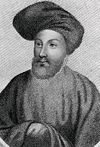 |
Edward (Plantagenet) Edward of Norwich, 2nd Duke of York Sir Edward of Norwich, 2nd Duke of York, 2nd Earl of Cambridge, Earl of Rutland, Earl of Cork, Duke of Aumale KG was a member of the English royal family who died at the Battle of Agincourt.... |
January 1392 | September 1397 | Earl of Rutland |
| Ralph de Neville, 4th Baron Neville | September 1397 | October 1397 | 1st Earl of Westmorland from 29 September 1397 | |
 |
Edward Plantagenet Edward of Norwich, 2nd Duke of York Sir Edward of Norwich, 2nd Duke of York, 2nd Earl of Cambridge, Earl of Rutland, Earl of Cork, Duke of Aumale KG was a member of the English royal family who died at the Battle of Agincourt.... (again) |
October 1397 | August 1399 | Duke of Albemarle and Earl of Rutland |
| Sir Thomas de Rempston Thomas Rempston Sir Thomas Rempston KG ,was Constable of the Tower and an MP.He was born the son of John Rempston at Rempstone, Nottinghamshire, where the family had long been settled.... |
October 1399 | Drowned at London Bridge, 31 October 1406 | ||
 |
Edward (Plantagenet) Edward of Norwich, 2nd Duke of York Sir Edward of Norwich, 2nd Duke of York, 2nd Earl of Cambridge, Earl of Rutland, Earl of Cork, Duke of Aumale KG was a member of the English royal family who died at the Battle of Agincourt.... (again) |
November 1406 | 1413 | now Duke of York, slain at Agincourt, 1415 |
| John Dabrichecourt | 1413 | 1413 | ||
| Robert de Morley | 1413 | 1415 | ||
| William Bourchier | November 1415 | Earl of Eu, 1419, d. 1420 | ||
| Roger Aston | July 1420 | August 1420 | ||
| John Holland, Earl of Huntingdon John Holland, 2nd Duke of Exeter John Holland, 2nd Duke of Exeter KG was an English nobleman and military commander during the Hundred Years' War.-Family:... |
August 1420 | Duke of Exeter | ||
| James Fienes, Lord Say James Fiennes, 1st Baron Saye and Sele James Fiennes, 1st Baron Saye and Sele was an English soldier and politician, son of Sir William Fiennes and wife Elizabeth Batisford .... |
1447 | July 1450 | Murdered by Jack Cade Jack Cade Jack Cade was the leader of a popular revolt in the 1450 Kent rebellion during the reign of King Henry VI in England. He died on the 12th July 1450 near Lewes. In response to grievances, Cade led an army of as many as 5,000 against London, causing the King to flee to Warwickshire. After taking and... 's mob, 4 July 1450 |
|
| Henry Holland, 3rd Duke of Exeter Henry Holland, 3rd Duke of Exeter Henry Holland, 3rd Duke of Exeter was a Lancastrian leader during the English Wars of the Roses. He was the only son of John Holland, 2nd Duke of Exeter and his first wife Lady Anne Stafford. His maternal grandparents were Edmund Stafford, 5th Earl of Stafford and Anne of Gloucester.He inherited... |
June 1451 | |||
| William Bourchier, Viscount Bourchier | September 1460 | |||
| John Tiptoft, Earl of Worcester John Tiptoft, 1st Earl of Worcester John Tiptoft, 1st Earl of Worcester KG , English nobleman and scholar, was the son of John Tiptoft, 1st Baron Tiptoft and Joyce Cherleton, co-heiress of Edward Charleton, 5th Baron Cherleton. He was also known as the Butcher of England... |
December 1461 | October 1470 | Executed by Lancastrians, 18 October 1470 | |
| John Sutton, Baron Dudley John Sutton, 1st Baron Dudley John Sutton, 1st Baron Dudley, KG was an English nobleman. A diplomat and councillor of Henry VI, he fought in several battles during the Hundred Years War and the Wars of the Roses, and acted as Lord Lieutenant of Ireland 1428–1430.-Family and peerage:John Sutton was born at 25 December 1400 and... |
1470 | |||
| Thomas Grey, Marquis of Dorset Thomas Grey, 1st Marquess of Dorset Thomas Grey, 7th Baron Ferrers of Groby, 1st Earl of Huntingdon and 1st Marquess of Dorset, KG , was an English nobleman, courtier and a man of mediocre abilities pushed into prominence by his mother Elizabeth Woodville's second marriage to the king, Edward IV.-Family:Thomas was born about 1455,... |
April 1483 | in office before accession of Edward V Edward V of England Edward V was King of England from 9 April 1483 until his deposition two months later. His reign was dominated by the influence of his uncle Richard, Duke of Gloucester, who succeeded him as Richard III... in 1483 |
||
| Sir Robert Brackenbury Robert Brackenbury Sir Robert Brackenbury was an English nobleman and courtier. He was a close associate of Richard III of England.-Early life:... |
July 1483 | Killed at Bosworth Field, 22 August 1485 | ||
| John de Vere, Earl of Oxford John de Vere, 13th Earl of Oxford John de Vere, 13th Earl of Oxford , the second son of John de Vere, 12th Earl of Oxford, and Elizabeth Howard, was one of the principal Lancastrian commanders during the English Wars of the Roses... |
September 1485 | 1513 | ||
| Sir Thomas Lovell | March 1513 | 1524 | ||
| Sir William Kingston William Kingston Sir William Kingston was an English courtier, soldier and administrator. He was the Constable of the Tower of London during much of the reign of Henry VIII. Among the notable prisoners he was responsible for were Queen Anne Boleyn, and the men accused of adultery with her.-Life:He was of a... |
May 1524 | 1540 | ||
| Sir John Gage Sir John Gage Sir John Gage KG was an English courtier during the Tudor period. He held a number of offices, including Chancellor of the Duchy of Lancaster , Comptroller of the Household , Constable of the Tower and Lord Chamberlain .-Early life and family:Gage was born in 1479 at Burstow in Surrey... |
October 1540 | 1553 | ||
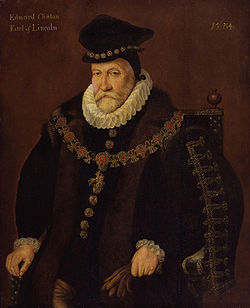 |
Edward Clinton, 9th Baron Clinton Edward Clinton, 1st Earl of Lincoln Edward Fiennes, 1st Earl of Lincoln, KG, also known as Edward Clinton was an English nobleman and Lord High Admiral.-Background:... |
July 1553 | August 1553 | 1st Earl of Lincoln from 1572 |
| Sir John Gage Sir John Gage Sir John Gage KG was an English courtier during the Tudor period. He held a number of offices, including Chancellor of the Duchy of Lancaster , Comptroller of the Household , Constable of the Tower and Lord Chamberlain .-Early life and family:Gage was born in 1479 at Burstow in Surrey... (again) |
August 1553 | 1556 | ||
| Sir Edward Braye Edward Braye Sir Edward Braye was an English Royal Navy captain, Justice of the Peace, High Sheriff and MP.He was born the son of John Braye of Eaton Bray, Bedfordshire and the younger brother of Edmund Braye... |
1556 | 1557 | ||
| Sir Robert Oxenbridge | January 1557 | 1558 | ||
| Peter Carew Peter Carew Sir Peter Carew was an English adventurer, who served during the reign of Queen Elizabeth of England and took part in the Tudor conquest of Ireland.He is to be distinguished from another Sir Peter Carew Sir Peter Carew (1514? – 27 November 1575) was an English adventurer, who served during the... |
1572 | 1572 | ||
| Sir Richard Berkeley Richard Berkeley (died 1604) Sir Richard Berkeley of Stoke Gifford, Gloucestershire was MP for Gloucestershire in 1604. He had previously served as Sheriff of Gloucestershire in 1564, and as Deputy Lieutenant of Gloucestershire. He was knighted by Queen Elizabeth I in 1568. In 1595 he was appointed Lieutenant of the Tower of... of Stoke Gifford |
1595 | |||
| Sir William Wade (Lieutenant) | 1605 | 1611 | ||
| Sir Gervase Helwys Gervase Helwys Sir Gervase Helwys , also known as Jervis Yelwys, was a Lieutenant of the Tower of London found guilty of complicity in the murder of Sir Thomas Overbury and hanged in 1615. The scandal provoked much public and literary conjecture and irreparably tarnished King James I's court with an image of... (Lieutenant) |
1611 | 1615 | ||
| Sir George More George More Sir George More was an English courtier and politician who sat in the House of Commons at various times between 1584 and 1625.More was the son of Sir William More of Loseley Park, Surrey... (Lieutenant) |
1615 | 1617 | ||
| Sir Allen Apsley (Lieutenant) | 1617 | 1630 | ||
| Sir Thomas Lunsford (Lieutenant) | 1641 | 1641 | served for a few days, per Clarendon Edward Hyde, 1st Earl of Clarendon Edward Hyde, 1st Earl of Clarendon was an English historian and statesman, and grandfather of two English monarchs, Mary II and Queen Anne.-Early life:... |
|
| Francis, Baron Cottington | 1640 | William Balfour William Balfour (general) Sir William Balfour , of the family of Balfour of Pitcullo, Fifeshire, Scotland, was a general of the parliamentary forces during the English Civil War.... was his Lieutenant |
||
 |
Mountjoy Blount, 1st Earl of Newport Mountjoy Blount, 1st Earl of Newport Mountjoy Blount, 1st Earl of Newport , created Baron Mountjoy in the Irish peerage , baron Mountjoy of Thurveston in the English peerage and Earl of Newport was appointed master of ordnance to Charles I of England and played an ambiguous part in the early years of the English Civil War.He was... |
1641 | ||
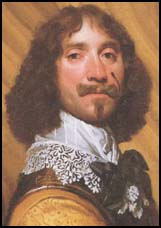 |
John Byron, 1st Baron Byron John Byron, 1st Baron Byron John Byron, 1st Baron Byron was an English Royalist and supporter of Charles I during the English Civil War.-Life:... (Lieutenant) |
1641 | 1642 | |
| Sir Thomas Fairfax Thomas Fairfax, 3rd Lord Fairfax of Cameron Thomas Fairfax, 3rd Lord Fairfax of Cameron was a general and parliamentary commander-in-chief during the English Civil War... |
August 1647 | 1650 | Robert Tichborne Robert Tichborne Sir Robert Tichborne , was an English soldier who fought in the English Civil War and a regicide of Charles I.Before the war he was a linen-draper by trade. In 1643 he was a captain in the London trained bands. He was lieutenant of the Tower of London in 1647. He was an extreme republican and... was his Lieutenant. |
|
| Sir John Robinson, 1st Baronet Sir John Robinson, 1st Baronet, of London Sir John Robinson, 1st Baronet, of London was an English merchant and politician who sat in the House of Commons between 1660 and 1667. He was Lord Mayor of London in 1662.... |
1660 | 1675 | ||
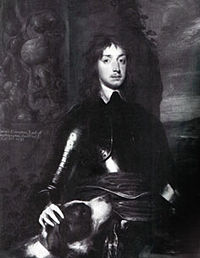 |
James Compton, 3rd Earl of Northampton James Compton, 3rd Earl of Northampton James Compton, 3rd Earl of Northampton , known as Lord Compton from 1630 to 1643, was an English peer, soldier and politician.... |
1675 | 1679 | |
| William Alington, 3rd Baron Alington William Alington, 3rd Baron Alington Major General William Alington, 3rd Baron Alington LL was an Irish peer, the son of William Alington, 1st Baron Alington. He succeeded to the title title of 3rd Baron Alington of Killard, co... |
1679 | 1685 | ||
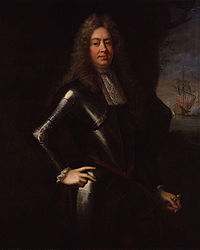 |
George Legge, 1st Baron Dartmouth George Legge, 1st Baron Dartmouth Admiral George Legge, 1st Baron Dartmouth PC was an English naval commander who gave distinguished service to both Charles II and James II.-Biography:... |
1685 | 1688 | |
| Robert Lucas, 3rd Baron Lucas | 1688 | 1702 | ||
| Montagu Venables-Bertie, 2nd Earl of Abingdon Montagu Venables-Bertie, 2nd Earl of Abingdon Montagu Venables-Bertie, 2nd Earl of Abingdon PC was an English nobleman. The eldest son of James Bertie, 1st Earl of Abingdon and Eleanora Lee, he was styled Lord Norreys until he succeeded his father as 2nd Earl of Abingdon on the latter's death on the 22 May 1699... |
1702 | 1705 | ||
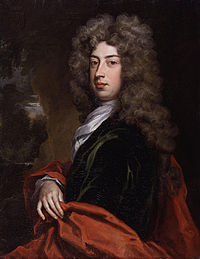 |
Algernon Capell, 2nd Earl of Essex Algernon Capell, 2nd Earl of Essex Algernon Capell, 2nd Earl of Essex PC was an English nobleman, a soldier and courtier. He was the son of Arthur Capell, 1st Earl of Essex and Elizabeth Percy. After his father's suicide in 1683, Capell became the 2nd Earl of Essex... |
1706 | 1710 | |
| Richard Savage, 4th Earl Rivers Richard Savage, 4th Earl Rivers Richard Savage, 4th Earl Rivers PC was the second son of Thomas, 3rd Earl; and after the death about 1680 of his elder brother Thomas, styled Viscount Colchester, he was designated by that title until he succeeded to the peerage.... |
1710 | 1712 | ||
| George Compton, 4th Earl of Northampton George Compton, 4th Earl of Northampton George Compton, 4th Earl of Northampton, PC , styled Lord Compton from 1664 to 1681, was a British peer.... |
1712 | 1715 | ||
| Charles Howard, 3rd Earl of Carlisle Charles Howard, 3rd Earl of Carlisle Charles Howard, 3rd Earl of Carlisle, PC was a British statesman and member of the peerage of England.Charles Howard was the eldest son of Edward Howard and inherited his title on the death of his father in 1692. He married in 1683 Lady Anne de Vere Capell, daughter of Arthur Capell, 1st Earl of... |
1715 | 1722 | ||
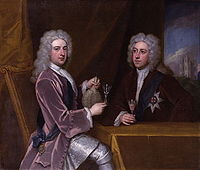 |
Henry Clinton, 7th Earl of Lincoln Henry Clinton, 7th Earl of Lincoln Henry Clinton, 7th Earl of Lincoln, KG, PC was the son of Francis Clinton, 6th Earl of Lincoln and his second wife Susan Penniston, daughter of Anthony Penniston... |
1723 | 1725 | |
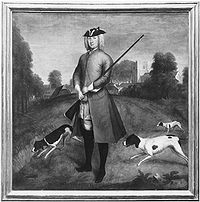 |
Charles Paulet, 3rd Duke of Bolton | 1725 | 1726 | |
| Henry Lowther, 3rd Viscount Lonsdale Henry Lowther, 3rd Viscount Lonsdale Henry Lowther, 3rd Viscount Lonsdale PC FRS was an English courtier and landowner.He succeeded to the Viscountcy in 1713, upon the death of his elder brother, Richard Lowther, 2nd Viscount Lonsdale... |
1726 | 1731 | ||
| John Sidney, 6th Earl of Leicester John Sidney, 6th Earl of Leicester John Sidney, 6th Earl of Leicester, PC was a Privy Councillor during the Georgian era.He was born and died at his family home of Penshurst Place in Kent and is buried at Penshurst. He was one of the five sons of Robert Sidney, 4th Earl of Leicester... |
1731 | 1737 | ||
| Charles Cornwallis, 1st Earl Cornwallis Charles Cornwallis, 1st Earl Cornwallis Charles Cornwallis, 1st Earl Cornwallis PC , styled The Honourable Charles Cornwallis until 1722 and known as The Lord Cornwallis between 1722 and 1753, was a British peer.-Background:... |
1740 | 1762 | ||
| John Berkeley, 5th Baron Berkeley of Stratton John Berkeley, 5th Baron Berkeley of Stratton John Berkeley, 5th Baron Berkeley of Stratton PC , styled The Honourable John Berkeley until 1741, was a British politician.-Background and education:... |
1762 | 1770 | ||
| Charles Cornwallis, 2nd Earl Cornwallis Charles Cornwallis, 1st Marquess Cornwallis Charles Cornwallis, 1st Marquess Cornwallis KG , styled Viscount Brome between 1753 and 1762 and known as The Earl Cornwallis between 1762 and 1792, was a British Army officer and colonial administrator... |
1770 | 1784 | ||
| The Lord George Lennox Lord George Lennox General Lord George Henry Lennox was the second son of Charles Lennox, 2nd Duke of Richmond, and was thus descended from King Charles II of England. He was a brother of the famous Lennox sisters.-Military career:... |
1784 | 1784 | ||
| Charles Cornwallis, 2nd Earl Cornwallis Charles Cornwallis, 1st Marquess Cornwallis Charles Cornwallis, 1st Marquess Cornwallis KG , styled Viscount Brome between 1753 and 1762 and known as The Earl Cornwallis between 1762 and 1792, was a British Army officer and colonial administrator... |
1784 | 1805 | 1st Marquess Cornwallis from 1792 | |
| Francis Rawdon-Hastings, 1st Marquess of Hastings Francis Rawdon-Hastings, 1st Marquess of Hastings Francis Edward Rawdon-Hastings, 1st Marquess of Hastings KG PC , styled The Honourable Francis Rawdon from birth until 1762 and as The Lord Rawdon between 1762 and 1783 and known as The Earl of Moira between 1793 and 1816, was an Irish-British politician and military officer who served as... |
1806 | 1826 | ||
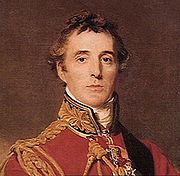 |
Arthur Wellesley, 1st Duke of Wellington Arthur Wellesley, 1st Duke of Wellington Field Marshal Arthur Wellesley, 1st Duke of Wellington, KG, GCB, GCH, PC, FRS , was an Irish-born British soldier and statesman, and one of the leading military and political figures of the 19th century... |
1826 | 1852 | |
| Stapleton Cotton, 1st Viscount Combermere Stapleton Cotton, 1st Viscount Combermere Field Marshal Stapleton Cotton, 1st Viscount Combermere GCB, GCH, KSI, PC , was a British military leader, diplomat and politician... |
1852 | 1865 | ||
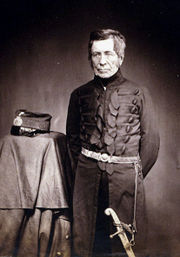 |
Sir John Burgoyne, Baronet John Fox Burgoyne Field Marshal Sir John Fox Burgoyne, 1st Baronet GCB was a British Army officer.-Military career:Burgoyne was the illegitimate son of General John Burgoyne and opera singer Susan Caulfield. In 1798, he was commissioned into the Royal Engineers as a Second Lieutenant... |
1865 | 1871 | |
| Sir George Pollock George Pollock Field Marshal Sir George Pollock, 1st Baronet, GCB, GCSI was a British soldier.-Military career:Educated at the Royal Military Academy, Woolwich, Pollock was commissioned into the Bengal Artillery in 1803.... |
1871 | 1872 | ||
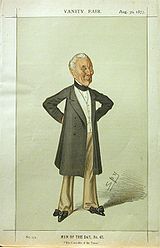 |
Sir William Maynard Gomm William Maynard Gomm Field Marshal Sir William Maynard Gomm GCB , was a British Army commander.-Military career:He was gazetted to the 9th Foot at the age of ten in recognition of the services of his father, Lieutenant-Colonel William Gomm, who was killed in the attack on Guadaloupe... |
1872 | 1875 | |
| Sir Charles Yorke Charles Yorke (British Army officer) Field Marshal Sir Charles Yorke KCB was a senior British Army officer who went on to be Military Secretary.-Military career:... |
1875 | 1880 | ||
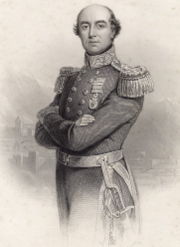 |
Sir William Fenwick Williams | 1881 | 1881 | |
| Sir Richard James Dacres | 1881 | 1886 | ||
 |
Robert Napier, 1st Baron Napier of Magdala Robert Napier, 1st Baron Napier of Magdala Field Marshal Robert Cornelis Napier, 1st Baron Napier of Magdala, GCB, GCSI, CIE, FRS was a British soldier.-Early life:... |
1886 | 1890 | |
| Sir Daniel Lysons Daniel Lysons (British Army officer) General Sir Daniel Lysons GCB was a British Army general who achieved high office in the 1870s.-Military career:... |
1890 | 1898 | ||
| Sir Frederick Stephenson Frederick Stephenson General Sir Frederick Charles Arthur Stephenson GCB was Major General commanding the Brigade of Guards and General Officer Commanding the Home District.-Military career:Stephenson was commissioned into the Scots Guards in 1837... |
1898 | 1911 | ||
| Sir Henry Evelyn Wood | 1911 | 1919 | ||
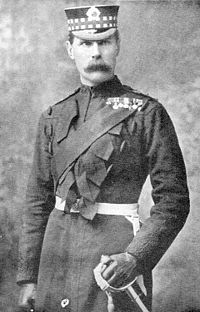 |
Paul Methuen, 3rd Baron Methuen Paul Methuen, 3rd Baron Methuen Field Marshal Paul Sanford Methuen, 3rd Baron Methuen GCB, GCMG, GCVO was a British military commander.-Early life:... |
1920 | 1932 | |
 |
George Milne, 1st Baron Milne George Milne, 1st Baron Milne Field Marshal George Francis Milne, 1st Baron Milne, GCB, GCMG, DSO , was a British military commander who served as Chief of the Imperial General Staff from 1926 to 1933.-Army career:... |
1933 | 1938 | |
| Sir Claud William Jacob Claud Jacob Field-Marshal Sir Claud William Jacob GCB GCSI KCMG was a British Army officer who served in the First World War.-Military career:... |
1938 | 1943 | ||
| Sir Philip Chetwode, 7th Baronet Philip Chetwode, 1st Baron Chetwode Field Marshal Philip Walhouse Chetwode, 1st Baron Chetwode, 7th Baronet of Oakley, GCB, OM, GCSI, KCMG, DSO was a British cavalry officer who became Commander in Chief in India.-Early life and education:... |
1943 | 1948 | 1st Baron Chetwode from 1945 | |
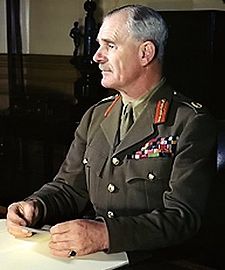 |
Archibald Wavell, 1st Earl Wavell Archibald Wavell, 1st Earl Wavell Field Marshal Archibald Percival Wavell, 1st Earl Wavell GCB, GCSI, GCIE, CMG, MC, PC was a British field marshal and the commander of British Army forces in the Middle East during the Second World War. He led British forces to victory over the Italians, only to be defeated by the German army... |
1948 | 1950 | |
 |
Alan Brooke, 1st Viscount Alanbrooke Alan Brooke, 1st Viscount Alanbrooke Field Marshal The Rt. Hon. Alan Francis Brooke, 1st Viscount Alanbrooke, KG, GCB, OM, GCVO, DSO & Bar , was a senior commander in the British Army. He was the Chief of the Imperial General Staff during the Second World War, and was promoted to Field Marshal in 1944... |
1950 | 1955 | |
 |
Henry Maitland Wilson, 1st Baron Wilson Henry Maitland Wilson, 1st Baron Wilson Field Marshal Henry Maitland Wilson, 1st Baron Wilson, GCB, GBE, DSO , also known as "Jumbo" Wilson, saw active service in the Second Boer War and First World War, and became a senior British general in the Middle East and Mediterranean during the Second World War... |
1955 | 1960 | |
| Harold Alexander, 1st Earl Alexander of Tunis Harold Alexander, 1st Earl Alexander of Tunis Field Marshal Harold Rupert Leofric George Alexander, 1st Earl Alexander of Tunis was a British military commander and field marshal of Anglo-Irish descent who served with distinction in both world wars and, afterwards, as Governor General of Canada, the 17th since Canadian... |
1960 | 1965 | ||
 |
Sir Gerald Walter Robert Templer Gerald Templer Field Marshal Sir Gerald Walter Robert Templer KG, GCB, GCMG, KBE was a British military commander. He is best known for his defeat of the guerrilla rebels in Malaya between 1952 and 1954... |
1965 | 1970 | |
| Sir Richard Hull | 1970 | 1975 | ||
| Sir Geoffrey Baker Geoffrey Baker Field Marshal Sir Geoffrey Harding Baker GCB, CMG, CBE, MC was Chief of the General Staff, the professional head of the British Army.-Army career:... |
1975 | May 1980 | ||
| Sir Peter Hunt | June 1980 | July 1985 | ||
| Sir Roland Gibbs Roland Gibbs Field Marshal Sir Roland Christopher Gibbs GCB, CBE, DSO, MC, KStJ was Chief of the General Staff, the professional head of the British Army, from 1976 to 1979, and Lord Lieutenant of Wiltshire from 1989 to 1996.... |
August 1985 | July 1990 | ||
| Sir John Stanier | August 1990 | July 1996 | ||
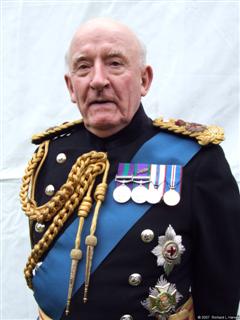 |
Sir Peter Inge Peter Inge, Baron Inge Field Marshal Peter Anthony Inge, Baron Inge was the Chief of the General Staff, the professional head of the British Army, between 1992 and 1994. He then served as Chief of the Defence Staff before retiring in 1997.-Army career:... |
August 1996 | July 2001 | Baron Inge from 1997 |
| Sir Roger Wheeler | August 2001 | July 2009 | ||
.jpg) |
Richard Dannatt, Baron Dannatt | August 2009 |

